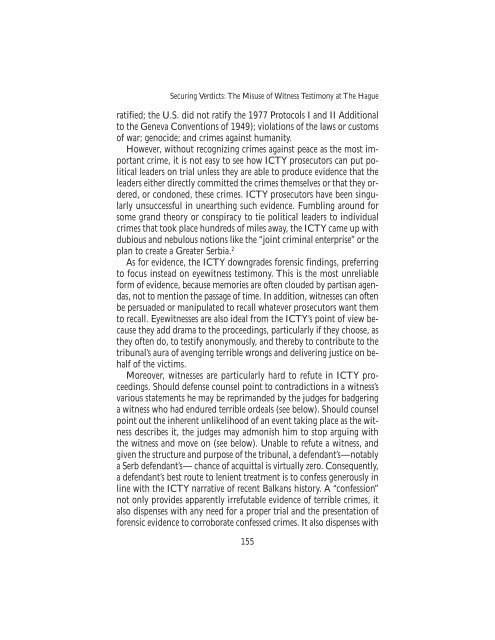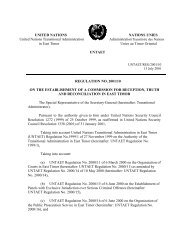The Srebrenica Massacre - Nova Srpska Politicka Misao
The Srebrenica Massacre - Nova Srpska Politicka Misao
The Srebrenica Massacre - Nova Srpska Politicka Misao
Create successful ePaper yourself
Turn your PDF publications into a flip-book with our unique Google optimized e-Paper software.
Securing Verdicts: <strong>The</strong> Misuse of Witness Testimony at <strong>The</strong> Hague<br />
ratified; the U.S. did not ratify the 1977 Protocols I and II Additional<br />
to the Geneva Conventions of 1949); violations of the laws or customs<br />
of war; genocide; and crimes against humanity.<br />
However, without recognizing crimes against peace as the most important<br />
crime, it is not easy to see how ICTY prosecutors can put political<br />
leaders on trial unless they are able to produce evidence that the<br />
leaders either directly committed the crimes themselves or that they ordered,<br />
or condoned, these crimes. ICTY prosecutors have been singularly<br />
unsuccessful in unearthing such evidence. Fumbling around for<br />
some grand theory or conspiracy to tie political leaders to individual<br />
crimes that took place hundreds of miles away, the ICTY came up with<br />
dubious and nebulous notions like the “joint criminal enterprise” or the<br />
plan to create a Greater Serbia. 2<br />
As for evidence, the ICTY downgrades forensic findings, preferring<br />
to focus instead on eyewitness testimony. This is the most unreliable<br />
form of evidence, because memories are often clouded by partisan agendas,<br />
not to mention the passage of time. In addition, witnesses can often<br />
be persuaded or manipulated to recall whatever prosecutors want them<br />
to recall. Eyewitnesses are also ideal from the ICTY’s point of view because<br />
they add drama to the proceedings, particularly if they choose, as<br />
they often do, to testify anonymously, and thereby to contribute to the<br />
tribunal’s aura of avenging terrible wrongs and delivering justice on behalf<br />
of the victims.<br />
Moreover, witnesses are particularly hard to refute in ICTY proceedings.<br />
Should defense counsel point to contradictions in a witness’s<br />
various statements he may be reprimanded by the judges for badgering<br />
a witness who had endured terrible ordeals (see below). Should counsel<br />
point out the inherent unlikelihood of an event taking place as the witness<br />
describes it, the judges may admonish him to stop arguing with<br />
the witness and move on (see below). Unable to refute a witness, and<br />
given the structure and purpose of the tribunal, a defendant’s—notably<br />
a Serb defendant’s— chance of acquittal is virtually zero. Consequently,<br />
a defendant’s best route to lenient treatment is to confess generously in<br />
line with the ICTY narrative of recent Balkans history. A “confession”<br />
not only provides apparently irrefutable evidence of terrible crimes, it<br />
also dispenses with any need for a proper trial and the presentation of<br />
forensic evidence to corroborate confessed crimes. It also dispenses with<br />
155



